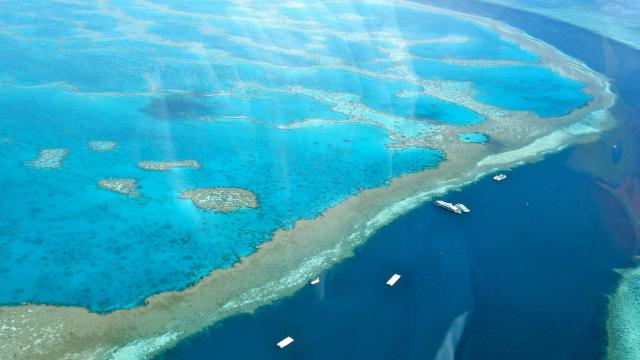With the Great Barrier Reef under unprecedented environmental stress, a new report is raising the alarm in terms of its potential economic loss. Valued at $56 billion, the largest living structure on Earth is now deemed “too big to fail”.
A view of the Great Barrier Reef from a helicopter ride. The reef is responsible for an estimated 64,000 tourism jobs, according to a new Deloitte report. (Image: Sarah Ackerman/Flickr)
Located off the coast of Queensland, Australia, the Great Barrier reef is the largest coral reef system in the world. For the past few years, the corals have been undergoing a mass bleaching event that scientists primarily attribute to excessively warm waters. When water gets too warm, corals expel the algae living within, causing the coral to turn a ghostly white and eventually, starve. Earlier this year, a survey suggested that two-thirds of the GBR has suffered bleaching. Mercifully, a report issued just a few days ago shows that the global coral bleaching event may be coming to an end — but much of the damage has already been done.
It’s not clear how long it will take — or even if — the bleached portions of the Great Barrier Reef will bounce back. But as a new report compiled by Deloitte Access Economics points out, the loss of the reef would represent an economic catastrophe for those who depend on it.
As an asset, the GBR is worth an estimated $56 billion, of which $29 billion comes from the tourism industry, and its 64,000 jobs. Approximately $24 billion is attributed to indirect or non-use value, which describes people who know of the reef but have not yet visited (so it’s a measure of economic potential). The final $3 billion comes from recreational use, such as boating.
The report, commissioned by Great Barrier Reef Foundation, is the first to calculate the economic value of the GBR. It involved a survey of 1500 Australian and international respondents from 10 countries. The results show the extent to which people have come to depend on the Unesco World Heritage Site.
“This timely report is a much needed, holistic view of the incredible economic value and opportunities provided by the Great Barrier Reef,” noted US politician and environmentalist Al Gore in the report. “Any failure to protect this indispensable natural resource would have profound impacts not only to Australia but around the world.”
Great Barrier Reef Foundation director Steve Sargent said the report “sends a clear message that the Great Barrier Reef — as an ecosystem, as an economic driver, as a global treasure — is too big to fail,” adding that at $56 billion, “the reef is valued at more than 12 Sydney Opera Houses.”
While climate change has been implicated in coral bleaching, there are other factors threatening reefs as well, such as farming runoff, urban development, and cyclic outbreaks of crown-of-thorns starfish (which prey upon coral polyps). Frequent boating accidents and powerful cyclones aren’t helping matters, either.
Last month, experts gathered in Australia to brainstorm solutions. Ideas included developing coral nurseries, increasing the efficiency and scope of starfish culls, expanding monitoring systems, identifying priority sites of the reef for conservation, and of course, cutting greenhouse gas emissions to prevent a further rise in sea surface temperatures.
By putting the loss of the Great Barrier Reef into economic terms, it’s hoped that people might finally start to take note and respond accordingly. Which is actually kind of sad.
